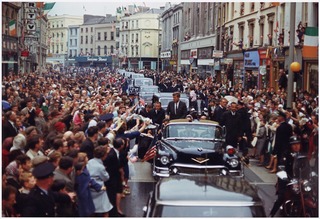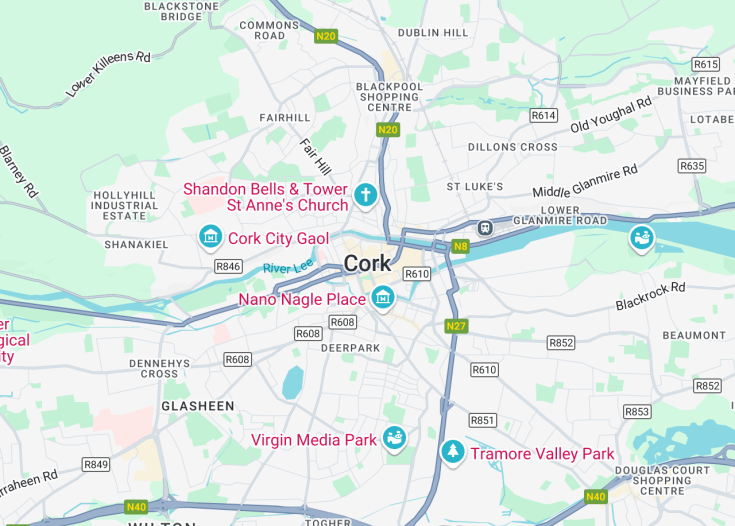Cork, known affectionately as “The Rebel City,” is located in the southwest of Ireland. This vibrant city is the second largest in the country and offers a rich tapestry of cultural history and modernity. Visitors can explore its quaint cobblestone streets, bustling markets, and the famous English Market, a cornucopia of local and international delicacies. Cork is also an ideal gateway to the scenic landscapes of County Cork, where one can delve into picturesque villages, rugged coastlines, and the legendary Blarney Castle, home of the Blarney Stone.
For a unique experience in Cork, visit during the Cork Jazz Festival, one of Europe’s leading jazz events, which takes place annually in October.
Don’t miss a trip to the historic Cork City Gaol, which offers a glimpse into 19th-century prison life as well as panoramic views of the city.
Top things to do & see in Cork
Select the following sights and activities to discover best tickets and tours available in Cork.
Cork: A Touch of Irish Charm
| Country | Ireland |
| Time in Cork | GMT+1 |
| Language spoken | Irish, English |
| Population | 222,000 (CSO 2022) |
| Currency | Euro (€, EUR) |
| Airports | Cork Airport (5 mi / 8 km). |
Cork, located in the southwest of Ireland, is a city rich in history and boasts a vibrant cultural scene. Established as a monastic settlement by Saint Finbarr in the 6th century, Cork has grown into Ireland’s second-largest city. Its city center is set on an island in the River Lee, making it a picturesque city with waterways comparable to Venice. Cork’s architectural heritage features narrow streets and significant buildings such as Saint Fin Barre’s Cathedral and the Cork City Gaol, which tells stories of the city’s past.
The city is renowned for its culinary excellence, driven by locally sourced produce and a thriving food market scene highlighted by the famous English Market. Cultural enthusiasts enjoy the Cork Opera House, the Crawford Art Gallery, and a plethora of festivals including the Cork Jazz Festival, which draws international artists and audiences. The proximity to the scenic landscapes of County Cork, such as the rugged coastline and the lush rolling hills, allows nature lovers and outdoor adventurers to enjoy hiking, sailing, and exploring picturesque villages like Kinsale and Cobh.
Cork holds a significant position in Irish history, notably during the War of Independence where it was a focal point for many events. Today, it maintains a proud traditional Irish culture, evident in its language, music, and dance, embraced both by locals and visitors. Cork is also an educational hub, home to University College Cork (UCC), which contributes to its bustling, youthful atmosphere. With its combination of rich history, cultural vitality, and friendly locals, Cork offers a quintessentially Irish experience.
Where is Cork?
Cork is nestled in the southern part of Ireland, bordered by the Atlantic Ocean and characterized by lush landscapes and waterways.
Distances:
| Route | Distance by car | Time by car |
|---|---|---|
| Dublin to Cork | 160 mi | 2 hours 45 min |
| Galway to Cork | 125 mi | 2 hours 30 min |
| Limerick to Cork | 65 mi | 1 hour 30 min |
What is Cork famous for?
Corkis renowned for its rich cultural scene, historical architecture, and as a central hub of Irish traditions and cuisine, highlighted by the vibrant English Market.
History
Prehistoric Period to Early Middle Ages
Cork, located in the southwest of Ireland, boasts a rich history that dates back to prehistoric times when it was initially settled by hunter-gatherers. Archaeological finds, such as ancient tools and remnants of dwellings, suggest that the area has been inhabited for thousands of years. The name “Cork” originates from the Irish “Corcach,” meaning “marsh,” reflecting the city’s establishment on islands in the estuary of the River Lee. This strategic position significantly influenced its early development.
Medieval Cork (ca. 915-1600)
The formal establishment of the city began with the arrival of the Vikings around 915 AD. They turned Cork into a vibrant trading port, linking it with the broader Viking network across Europe. The Norman invasion of Ireland in the late 12th century further developed the city’s infrastructure, with the construction of notable structures like St. Mary’s Cathedral. During the medieval period, Cork was officially chartered as a city and became a pivotal maritime hub.
Modern Development and Expansion (1601-Present)
The siege of 1601 marked a turning point for Cork during the War of the Three Kingdoms, which resulted in significant reconstruction and expansion in the ensuing centuries. The 18th and 19th centuries saw Cork flourish as a global trading port, particularly noteworthy during the era of the transatlantic linen and butter trade. In the 20th century, Cork experienced both hardship and growth, enduring the effects of the Irish Civil War and later undergoing economic development, particularly in the technology and pharmaceutical industries. Today, Cork stands as a testament to resilience and evolution, balancing its historical heritage with modern advancements, making it a unique reflection of past and present.
Visit Cork
What to see and do in Cork, Ireland
Exploring Cork city offers a blend of rich history, vibrant cultural scenes, and picturesque landscapes. Visitors should not miss the historic Cork City Gaol, which provides insights into 19th-century prison life. The St. Fin Barre’s Cathedral, a stunning example of Gothic architecture, is another must-see. For a taste of local culture, exploring the English Market, a roofed food market that has been operating since 1788, is essential. Nature enthusiasts will appreciate a walk through Fitzgerald’s Park and a visit to the University College Cork’s campus, which boasts beautiful Gothic revival architecture.
- Cork City Gaol
- St. Fin Barre’s Cathedral
- The English Market
- Fitzgerald’s Park
- University College Cork
Festive Delights in Cork
Cork hosts several annual events that reflect its rich cultural tapestry. The Cork Jazz Festival, held in late October, attracts jazz lovers from around the world. In June, the Cork Midsummer Festival showcases a wide range of arts, including theatre, dance, and opera, across various city venues. The Cork Film Festival, one of Ireland’s oldest film festivals, takes place in November and offers a platform for new and established filmmakers.
Best time to visit Cork
The best time to visit Cork is during the summer months, from June to August, when the weather is generally mild and pleasant, making it ideal for exploring the city and surrounding countryside. Additionally, this period coincides with several local festivals, providing visitors with ample opportunities to experience the city’s vibrant cultural events.
Is Cork worth visiting?
Cork is undoubtedly worth a visit. Its combination of rich history, vibrant cultural life, and stunning natural surroundings make it a unique destination. From visiting ancient castles and markets to enjoying modern culinary delights and lively festivals, Cork offers a dynamic and enriching experience for all travelers. Whether you’re a history buff, a nature lover, or a culture enthusiast, Cork provides an array of attractions that cater to diverse tastes and interests.









